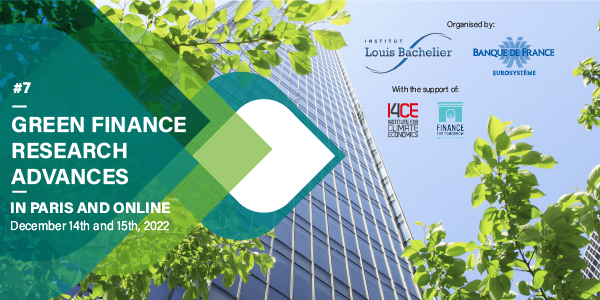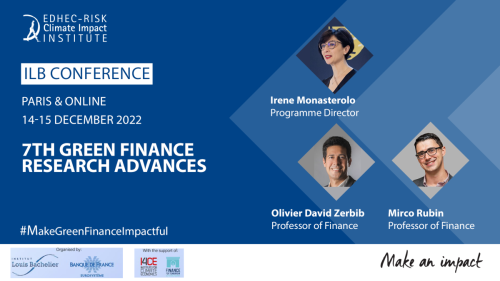7th Green Finance Research Advances Conference

Presentation
The conference is the 7th edition of a yearly event co-organized by Institut Louis Bachelier and Banque de France, with the participation of Finance For Tomorrow and the Institute for Climate Economics -I4CE.
The objective of the conference is to bring together academics, finance practitioners and regulators, to discuss together research issues related to the integration of climate risks (more generally environmental issues) into macro-economic modelling/forecasting and into the risk assessment of the financial sector.
While climate risks have much longer time horizons than traditional financial risks and cannot be dealt with without a clear understanding of long-term phenomena governing the joint evolution of climate and the economy, the short and medium-term aspects of energy transition are crucial for an orderly transition and are perhaps less well studied in the economic literature. This upcoming 7th Green Finance Research Advances therefore aims to highlight the short and medium-term climate risks and obstacles to energy transition and the role of central banks in addressing them.
The conference will cover, amongst others, the following topics:
- Climate-related financial risks and their transmission channels to the real economy (including sector-specific transmission channels of climate risks to financial stability)
- Climate-economy scenarios, scenario uncertainty, stress testing (including and possibly combining both physical and transition risks)
- Transition risks in the short and medium term, and the associated macroeconomic impacts
- Transition, energy prices and financial stability (also short and medium-term impact of the war in Ukraine on the transition)
- Obstacles to green transition: investment gap, greenflation, inequality/social aspects, lack of international cooperation
- Compounding effects, cascades and tipping points in physical and transition risks
- Climate risks, asset pricing and financial market dynamics
- Net zero scenarios and portfolio alignment analysis
- Data sets and data processing methodologies related to the above topics

Irene Monasterolo, Programme Director (Impact of Finance on Climate Change Mitigation and Adaptation), EDHEC Risk Climate Impact Institute and Professor of Climate Finance, EDHEC Business School, will present her paper entitled "The double materiality of climate physical and transition risks in the euro area", co-written with Nepo Dunz (The World Bank), Regis Gourdel (European Central Bank), Andrea Mazzocchetti (Ca' Foscari University of Venice), Laura Parisi (European Central Bank).
They show that double materiality impacts of climate physical and transition risks can be large for the euro area economy and banking sector. Further, investors' expectations of #climatepolicy credibility play a main role on economic decarbonization and transition. They find that an orderly transition achieves early co-benefits by reducing #carbonemissions (12% less in 2040 than in 2020) while supporting growth in economic output. In contrast, a disorderly transition worsens the euro area economic performance and financial stability, while high physical risks can make real GDP to shrink by 12,5% in 2050, in comparison with an orderly transition.
Olivier David Zerbib, Associate Professor of Finance, EDHEC Business School, Affiliate Member, EDHEC-Risk Climate Impact Institute, will present his paper entitled "When Green Investors Are Green Consumers", co-written with Maxime Sauzet (Boston University).
They bring investors with preferences for green assets to a general equilibrium setting in which they also prefer consuming green goods. Their preferences for green goods induce consumption premia on expected returns that counterbalance the green premium stemming from their preferences for green assets. Because they provide a hedge when green goods become expensive, brown assets command lower consumption premia, and green investors allocate a larger share of their portfolios towards them. Empirically, the green-minus-brown consumption premia differential reached 30-40 basis points annually, and contributes to explaining the limited impact of green investing on polluting firms’ costs of capital..
Mirco Rubin, Professor of Finance, EDHEC Business School, will present his paper entitled "Time-varying Environmental Betas and Latent Green Factors", co-written with Emanuele Chini, Research Engineer, EDHEC-Risk Climate Impact Institute and PhD student, EDHEC Business School.
Is US stock market pricing exposures to climate risks? In this paper they try to answer this question through the lenses of a latent factor model by extending the instrumented principal component analysis (IPCA) methodology of Kelly et al. (JFE 2019). They are able to extract latent factors from a panel of returns and a set of observable firm-level characteristics and to interpret our factors as purely “green" or “financial" factors. They find a green factor without defining (and constructing) it ex-ante, as typically done in the climate finance literature. Their factor is important to explain equity returns of companies in the Energy and Utilities sectors.
Further information on the conference can be found on the Institut Louis Bachelier website.




